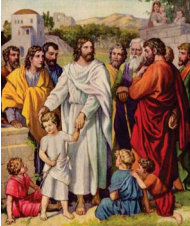It was a long flight from Washington to Dallas, and through a series of coincidences I was seated in first class. Just before the door closed, a gentleman boarded and sat beside me. As we introduced ourselves to one another, the man revealed he was the CEO of a Fortune 500 corporation. The conversation turned to leadership and what qualities my new acquaintance looked for in choosing executives in his company.
We discussed at length a theory of leadership popularly known as “servant–leader”. Simply put, the theory would suggest two models: leading by serving or serving by leading. That may sound like semantics; however, the difference is profound. It can be understood best by considering the emphasis: in one instance the emphasis in on serving which results in leading. In the other, the emphasis is on leading which is defined as serving.
The apostles of Jesus were in a debate as to which one of them was the most important, the first leader on the team after Jesus. Jesus brings them together and instructs them about servant leadership: “If anyone wishes to be first, he shall be the last of all and the servant of all.” (Lk 9:35).
In these times, it may appear that we do not see many servant leaders in our world. Yet one characteristic of servant leaders is they are not always visible! So I believe there are more servant leaders than there would seem to be. I say this with confidence because there are so many organizations, big and small, not-for profit and commercial, that are very successful and where employees are proudly loyal and devoted.
Jesus was the first expert in organizational behavior to teach servant leadership, in His own life and by His words. I am always surprised and excited to witness this leading by serving kind of leadership because not only does it yield the very best results for everyone, it is grounded in the dignity and worth of each person.
My traveling companion on that American Airlines flight was unaware of servant leadership yet could see how it could change a lot of things in his company. Employing it in our own daily lives also changes how we think about one another as it diminishes barriers and opens us to the unique gifts and beauty of others.
Little wonder that Jesus teaches it as a way to be number one!
Fr. Ronan
Twenty-Fifth Sunday in Ordinary Time
September 18/19, 2021

In today’s Gospel, we learn that the disciples of Jesus had been discussing among themselves who was the greatest.
Jesus is about to turn their idea as well as our society’s idea of “greatness” upside down.
He embraces a child and tries to help the Twelve understand that to be great is to be focused on something other than themselves.
Jesus teaches that true “greatness” lies in being a good steward of those who are not great:
welcoming one who is not viewed as great by our society’s standards, like the child, the innocent, the vulnerable, the suffering,
those who are outside our comfortable circle of family, friends, companions and colleagues, those who need a welcome.
Jesus redefines our notion of greatness. How do we define greatness?
Is our notion of greatness consistent with the teachings of Jesus Christ?
